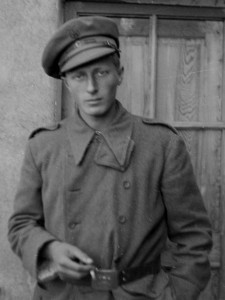ALBA’s Essay Contest Rewards Exciting New Research
The George Watt Prize for the best student essays received submissions from across the globe, the various entrants writing on topics of history, literature, politics, and culture of the Spanish Civil War, or the global political and cultural struggles against fascism in the 1920s and 1930s, or the contributions of the Americans who fought in support of the Spanish Republic from 1936 to 1938. The award is given annually to one undergraduate and one graduate student.
Both the graduate and undergraduate submissions were of remarkably high quality.
Carlos Nava, who graduated from Southern Methodist University in May 2015 with a BA in History, received the undergraduate award. Nava’s stimulating paper, “Mexican Divisions in Support of Republican Spain” (summary |full text in pdf) examines the popular debates in Mexico over which side to support in Spain. He recognizes the unique role that Mexico played as the only Western country to support the Spanish Republic. Nava describes Mexico’s monetary and military aid to the Republic and how the county accepted Spanish refugees and the Republican Government in exile after the Civil War. The essay most importantly demonstrates how divided Mexico was in its position toward Republican Spain. Most of Mexico’s conservatives, economic elites, and members of the clergy spoke out against the policies of President Cárdenas and used his support of the Spanish Republic to speak out against his regime. Nava concludes that only a minority of workers, intellectuals, and peasants sided with the Republicans. Carlos notes that his Mexican heritage guided his decision to write a research paper on Mexico’s involvement in the Spanish Civil War. His full text can be read here.
Jonathan Sherry, a PhD student in history at the University of Pittsburgh, received the graduate student award for his essay, “The Soviet show trial as export: justice and legal culture in the Spanish Civil War” (summary | full text in pdf). Drawing on exciting archival research, Sherry examines the Soviet-style show trial of the POUM leadership in 1938 Barcelona. He details how Soviet operatives hoped to discredit the POUM and Trotskyism in general with the trial, in much the same way that show trials were being used in the Soviet Union at the time. Soviet hopes failed with the acquittal of the POUM because leaders in Republican Spain used the trial to portray itself as part of the Western liberal-democratic judicial system. The full essay can be found here. This paper stands as a chapter of Sherry’s dissertation on Soviet involvement in the Spanish Civil War. The Watt Prize is one of a long string of awards for Sherry, who has also been awarded Andrew Mellon and Fulbright fellowships for his work.
This year’s jury was made up of three scholars: Josh Goode (Claremont Graduate University), Gina Herrmann (University of Oregon), and Aaron Retish (Wayne State University). The submissions were of remarkably high quality at both the undergraduate and graduate levels. They included diverse essays that together represent the liveliness of work being done on the Spanish Civil War, including: Irish volunteers to Spain, women in the Spanish Republic, Welsh coalminers’ support of the International Battalions, art of the Spanish Civil War, the impact of Spanish Civil War refugees on the American Left, and analyses of Hemingway’s writings and Civil War poetry.
The annual George Watt Memorial Essay award honors the memory of Abraham Lincoln Brigade veteran George Watt (1914-1994), a social worker, writer, and lifelong activist central to the creation of ALBA.
Aaron Retish, Professor of History at Wayne State University, heads the Watt Award committee.













